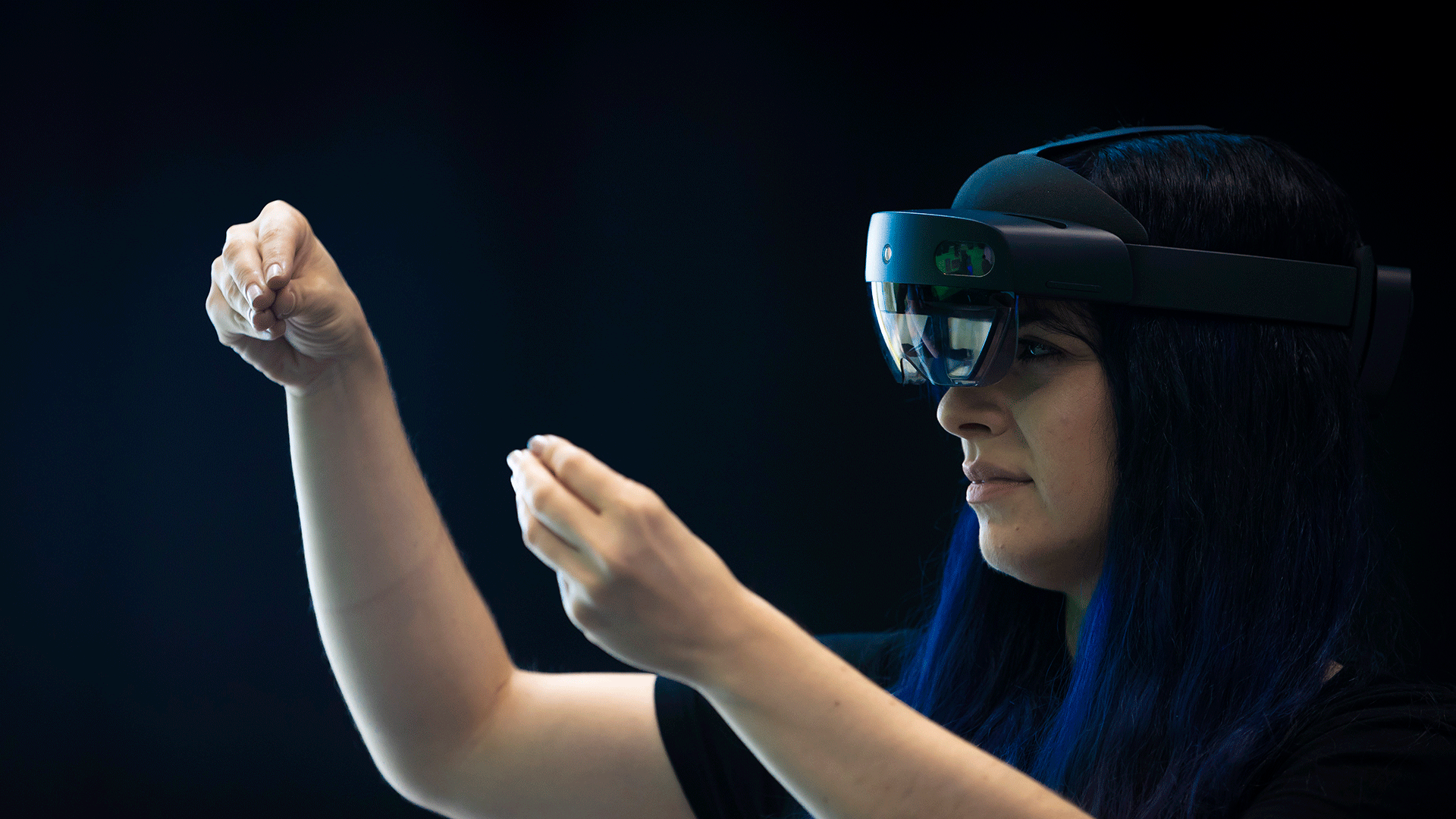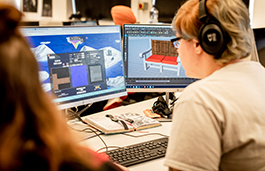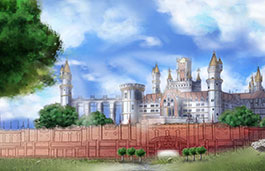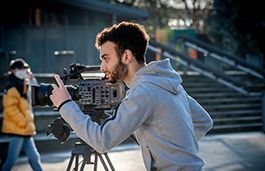Search
Virtual and Augmented Reality MA
Study level: PostgraduateConversion course

Develop creative, critical and technical skills and learn to design and collaborate on immersive art experiences applicable across various industries.
Year of entry
Location
Coventry University (Coventry)
Study mode
Full-time
Duration
1 year full-time
Course code
CAST026
Start date
January 2026
March 2026
May 2026
July 2026
Course overview
This course empowers you to develop the creative, critical, technical and leadership skills required to craft, perform, co-create and share immersive experiences.
- Gain hands-on experience with VR/AR tools, including motion capture suits, high-performance VR/AR systems and software such as Unreal Engine and Unity.4
- Engage in projects that unite students from a range of creative and technical backgrounds, fostering collaboration and innovation in immersive storytelling across industries such as entertainment, gaming, healthcare, cultural heritage, architecture, live arts and political activism.
- Develop a portfolio of work that reflects your ability to tackle real-world challenges in the creative industries.
5 QS Stars for Teaching and Facilities
QS Stars University RatingsRanked 9th Modern University in UK by the Times
The Times and Sunday Times Good University Guide 2025Ranked 4th for Overall Satisfaction in PTES
Postgraduate Taught Experience Survey (PTES) 2025Why you should study this course
- Industry-leading facilities and technology: access immersive technology including a Vicon motion capture lab, a dedicated VR lab and a digital hack space equipped with high-end computing. Work with the latest VR headsets, AR glasses and industry-standard software.4
- Strong industry connections and real-world projects: experience real-world briefs and playtesting opportunities, collaborate with immersive technology companies, and benefit from guest lectures by industry experts which have previously included Mathew Ragan (Sudo Magic) and Minsoo Kang (Basictech, South Korea), providing direct industry engagement and networking opportunities.2
- Interdisciplinary and collaborative learning: the course shares modules with other disciplines such as film, media and performance, promoting interdisciplinary collaboration.
- Employability and career prospects: graduates can explore a range of career opportunities in virtual production, immersive storytelling, game design, digital heritage, AR marketing and XR experience design for healthcare and education. The course is designed to equip you with technical and creative skills, ensuring you are ready for roles such as VR/AR developers, interaction designers and creative technologists.
- Adaptive learning approach and research-led teaching: rather than focusing solely on specific software, the course emphasises adaptive learning, ensuring you can upskill and remain competitive as technology evolves. With a research-informed curriculum, explore emerging trends in immersive design, human-computer interaction and extended reality storytelling, preparing you for both industry and academic research routes.
Collaborations

Endorsement by the Royal Society for Arts, Manufactures and Commerce (RSA)
Coventry University and the RSA have collaborated on a module concerning social and ethical responsibility. You will be entitled to a 12-month fellowship of the RSA so you can access all RSA resources and platforms during your period of study. Once you have successfully passed the Professional Practice and Innovation module, you will receive an RSA digital credential.
What you'll study
Rather than focusing solely on headset immersive technologies, you can expect to work across disciplines, producing hybridised post-digital work that challenges the conventions of media disciplines and encourages you to operate at the forefront of the expanding immersive sector.
Extensive expertise in the research and practice of immersive forms leads your learning and includes:
- performance/motion capture and networked performance
- spatial, 360° and volumetric filmmaking
- immersive sound design and multichannel music composition
- animation and games art.
We regularly review our course content, to make it relevant and current for the benefit of our students. For these reasons, course modules may be updated.
How you'll learn
Teaching and learning methods may include:
- group critiques
- artist talks and lectures
- masterclasses
- seminars
- tutorials
- field trips and industry visits2
- workshops.
Teaching and learning hours
As a full-time postgraduate student, you will study modules totalling 180 credits each academic year. A typical 30-credit module requires a total of 300 hours of study. Study hours are made up of teaching and learning hours, and guided and independent study.
Teaching hours
Teaching hours will vary, depending on where you are in your studies, but on average, you will have between 8 and 12 teaching and learning hours each week. You will also have the opportunity to attend optional sessions, including time with a Success Coach or to meet with staff for advice and feedback.
Guided and independent learning
Throughout your studies, you will be expected to spend time in guided and independent learning which will make up the required study hours per module. You will be undertaking a variety of activities, learning through guided background research, planning and preparation, studio activity, creative practice and making, reviewing what you have learned and completing assignments. This can be completed around your personal commitments. As you progress towards the end of your studies, you will spend more time on independent learning.
Online learning
As an innovative university, we use different teaching methods, including online tools and emerging technologies. So, some of your teaching hours and assessments may be delivered online.
Assessment
This course will be assessed using a variety of methods which could vary depending on the module. Assessment methods may include:
- immersive artefacts/bodies of work
- contextual documents
- portfolios
- proposals
- presentations
- research books.
The Coventry University assessment strategy aims to ensure that our courses are fairly assessed and allows us to monitor student progression towards achieving the intended learning outcomes.
Entry requirements
Typical entry requirements:
Fees and funding
| Student | Full-time | Part-time |
|---|---|---|
| UK, Ireland*, Channel Islands or Isle of Man | £11,200 | Not available |
| EU | £11,200 per year with EU Support Bursary** £18,600 per year without EU Support Bursary** |
Not available |
| International | £18,600 | Not available |
For advice and guidance on tuition fees3 and student loans visit our Postgraduate Finance page and see the university's Tuition Fee and Refund Terms and Conditions.
We offer a range of international scholarships to students all over the world. For more information, visit our International Scholarships page.
Tuition fees cover the cost of your teaching, assessments, facilities and support services. There may be additional costs not covered by this fee such as accommodation and living costs, recommended reading books, stationery, printing and re-assessments should you need them.
The following are additional costs not included in the tuition fees:
- Any optional overseas field trips or visits: £400+ per trip.
- Any costs associated with securing, attending or completing a placement (whether in the UK or abroad).
*Irish student fees
The rights of Irish residents to study in the UK are preserved under the Common Travel Area arrangement. If you are an Irish student and meet the residency criteria, you can study in England, pay the same level of tuition fees as English students and utilise the Tuition Fee Loan.
**EU Support Bursary
Following the UK's exit from the European Union, we are offering financial support to all eligible EU students who wish to study an undergraduate or a postgraduate degree with us full-time. This bursary will be used to offset the cost of your tuition fees to bring them in line with that of UK students. Students studying a degree with a foundation year with us are not eligible for the bursary.
Facilities
Coventry University is home to superb media facilities across our three main buildings: the Ellen Terry Building, a former Art Deco cinema; the Delia Derbyshire Building, named after the celebrated electronic composer; and our television studio, The Tank.
You can access post-production studios, games and animation studios, immersive studios and hack labs in the Delia Derbyshire Building.
Media loan service
Borrow from an extensive range of specialist, professional equipment, including digital film cameras, Blackmagic, Sony and RED cameras, audio equipment and lighting, with technical support from our knowledgeable staff.
Immersive lab
The Delia Derbyshire Building boasts a Vicon Shogun optical motion capture system and VR lab with high-powered VR-ready workstations, HP backpack VR systems and a post-production suite which hosts Avid Media Composer, the Adobe Suite and access to the Asset Management system. The immersive sound lab features an Adobe Atmos 15.1 sound system.
Broadcast Television Studio
Our on-campus TV studio, The Tank, has specialist TV studio equipment, including a live three-camera set-up, with a gallery for broadcasting across the internet. The Tank also features a green screen used for either live compositing or for use in post.
Facilities are subject to availability. Access to some facilities (including some teaching and learning spaces) may vary from those advertised and/or may have reduced availability or restrictions where the university is following public authority guidance, decisions or orders.
Careers and opportunities
On successful completion, you could explore a variety of careers.
VR or AR Developer: design, develop and implement VR/AR applications for industries such as gaming, marketing, education and entertainment. Work with programming languages and development tools like Unity, Unreal Engine, ARKit and ARCore.
Immersive Experience Designer: create engaging and interactive VR/AR experiences, focusing on user interaction and storytelling. Develop immersive content for sectors like museums, retail, tourism and live events.
Motion Capture Specialist: capture and process real-time motion data for use in VR/AR environments, gaming and film production. Operate motion capture suits and cameras, integrating motion data into virtual spaces.
3D Artist or Modeller for VR/AR: create 3D assets, environments and animations for VR/AR applications, ensuring visual quality and realism. Work in areas like gaming, film, architecture and product design.
XR (Extended Reality) Content Producer: oversee the creation and production of immersive content for VR, AR and mixed-reality experiences. Collaborate with creative and technical teams to produce high-quality XR projects.
User Experience (UX) Designer for Immersive Technologies: focus on the design and improvement of user interfaces and experiences within VR/AR applications. Ensure immersive environments are user-friendly, intuitive, and engaging.
VR or AR Marketing Specialist: develop and implement marketing campaigns using VR/AR technologies to engage consumers in unique and interactive ways. Work with brands and agencies to create immersive experiences for product launches, virtual showrooms or interactive advertisements.
VR or AR Project Manager: lead and manage cross-disciplinary teams in the development of VR/AR projects. Oversee project timelines, budgets, and deliverables, ensuring the successful execution of immersive technology initiatives.
Game Designer (VR/AR): design and develop gameplay mechanics, environments and characters for VR/AR games. Work closely with developers and artists to bring immersive gaming experiences to life.
Augmented Reality Consultant: advise companies on the implementation of AR technologies to enhance business processes, training, or customer engagement. Help businesses integrate AR into their operations or marketing strategies.
Educational Technology (EdTech) Specialist: design and implement VR/AR experiences for educational institutions and corporate training. Develop immersive learning modules and simulations for subjects ranging from science to soft skills training.
Creative Technologist (VR/AR): combine creativity and technical skills to develop innovative immersive experiences, working across fields like art, digital installations and interactive media. Experiment with new technologies to push the boundaries of VR/AR in creative sectors.
VR or AR Solutions Architect: design and develop complex VR/AR systems tailored to specific industries such as healthcare, manufacturing or architecture. Work with clients to create custom solutions for immersive simulations, training or product development.
Virtual Production Specialist: use VR/AR tools in filmmaking, game development and live events, to blend real-time virtual environments with live-action footage. Specialise in real-time rendering, virtual sets and motion tracking, in virtual production pipelines.
VR or AR Researcher: conduct research in emerging areas of VR/AR technology, human-computer interaction or immersive media. Contribute to advancing knowledge in the field by exploring new ways VR/AR can be applied in different industries.
Healthcare Simulation Specialist (VR/AR): develop VR/AR applications for healthcare training, patient care or rehabilitation. Create immersive medical simulations to enhance learning for healthcare professionals.
Architectural Visualisation Specialist: use VR/AR to create immersive architectural walkthroughs and designs. Collaborate with architects and real estate developers to provide clients with interactive, 3D visualisations of buildings or spaces.
Digital Twin Engineer: create virtual representations of physical objects, systems or environments using VR/AR technology. Develop digital twins for industries such as manufacturing, construction and urban planning, to monitor and optimise real-world systems.
Product Designer for Immersive Technologies: design and prototype VR/AR products, tools or hardware. Collaborate with engineers and designers to create immersive devices or accessories.
VR/AR Consultant for Public Engagement: advise cultural institutions, museums or governments on using VR/AR to engage the public. Develop immersive exhibitions, virtual tours or public outreach initiatives that use VR/AR to enhance user engagement.
How to apply
You may also like

Games Studio Development MA






